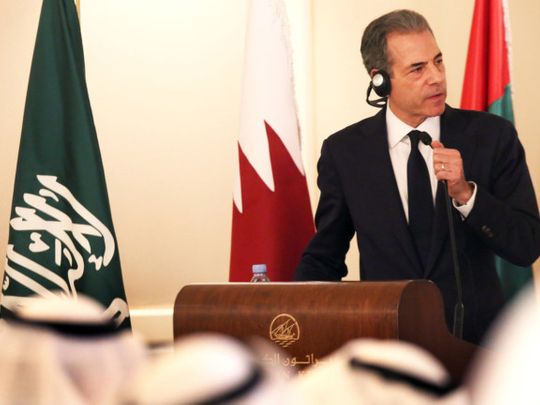
Kuwait City: Washington called on Monday for the battle against Daesh to be taken to the internet, as coalition partners vowed to step up efforts to counter the militants’ online propaganda.
Retired US general John Allen told participants at the talks in Kuwait City that Daesh was promoting its “horrendous brand of warfare” online, where it “recruits and perverts the innocent”.
“It is only when we contest Daesh’s presence online, deny the legitimacy of the message it sends to vulnerable young people... it is only then that Daesh will truly be defeated,” Allen said.
Allen, who is coordinating the US-led campaign against Daesh, met with representatives of coalition countries including Bahrain, Britain, Egypt, France, Iraq, Jordan, Lebanon, Oman, Qatar, Saudi Arabia and the UAE.
After the talks the coalition partners promised to take steps to boost efforts to prevent the recruitment of foreign fighters for Daesh, including online.
“This involves intensifying our engagement... enhancing exchanges, training and other cooperative programmes ... actively opposing the recruitment of foreign fighters,” they said in a statement.
Richard Stengel, the US undersecretary of state for diplomacy and public affairs, told reporters the goal of the meeting was to create “an information coalition that is parallel to the military coalition” fighting Daesh.
Stengel said the number of recruits joining Daesh has dropped, but provided no evidence or figures.
“We think that the attraction of Daesh is decreasing,” Stengel said.
Daesh, which has seized large parts of Syria and Iraq and declared an Islamic “caliphate”, operates a sophisticated online presence, posting frequent propaganda videos and publishing its own expertly designed magazine.
Some of the videos have featured brutal atrocities, including the on-camera beheadings of two US journalists and two British aid workers.
Daesh and its supporters also have a strong presence on social media, which has become an important recruitment tool to attract foreign fighters to their cause.
Western governments have been increasingly alarmed by the numbers of Europeans and Americans making their way to Syria to fight with Daesh.
‘Coordinated approach’
Concern is also growing over the group’s online influence among disaffected young Muslims living in the West and its calls for them to carry out attacks on Western targets.
Allen said the talks in Kuwait were focused on “how to degrade and defeat Daesh’s messaging and how we can all confront and contest its presence in the information space and online.”
This would require a “holistic, coordinated approach at the international, regional and local levels, combining military, law enforcement, intelligence, economic and diplomatic tools.”
Washington has built up a coalition of Western and Arab nations to combat Daesh, launching a series of air strikes against it in Iraq and Syria and backing local ground forces including the Iraqi army, Syrian rebels and Kurdish militia forces.












